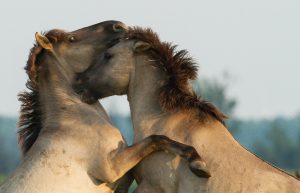Animal Rights Mediation Solutions to Protect Wild Horses

One of the biggest animal rights controversies has been the fate of wild horses in the US. The burro is federally protected, yet 1000s of horses have been sent to slaughterhouses. How did this happen? The answer lies in the difficulty of verifying that animal adoptions aren’t bogus, since many wild horses removed from the herd that are adopted legally are then being sold for their meat. The Bureau of Land Management has rounded up many wild horses to re-home them through adoption, yet the process has been fraught with danger for horses.
An investigation into the process by the New York Times and a report by the American Wild Horse Campaign in 2021 found that at minimum hundreds of horses were being re-sold to slaughter after being adopted. Another report from the American Wild Horse Campaign in 2022 found that even after the Bureau of Land Management tightened their adoption requirements to require stricter background checks and follow up, horses were still being sold into slaughter at an alarming rate. Reports even showed that there was a coordinated campaign by a group of people who were adopting wild horses and making up to $80,000 by selling the horses into slaughter.
What Can Be Done?
If the BLM’s policy on horses isn’t currently enough of a safety net for adopted horses, efforts will have to focus on rescuing horses who may be sold to slaughter or negotiating locally with the BLM and other parties to manage the round-up and adoption horses in a more humane and trusted manner.
Animal Rights mediation often becomes necessary in situations where drastic animal population control measures are about to be implemented which could re-home or even cull animals in the area. Some of the conflict parties in disputes over what to do about wild horses could include:
- Federal Wildlife authorities like the BLM or National Park Management
- Local cattle ranchers and farmers who don’t want the horses intruding on their land
- Horse advocates who want to keep horse herds together and make sure that no horse is sent to slaughter
- Environmentalists and ecosystem advocates who may be concerned about the horse’s impact on the local ecosystem
- People in the local community who are impacted by the horses either positively or negatively
- Indigenous tribes who may value the horses as part of their culture
These groups often have different interests, which can be reconciled by working together. Advocates for wild horses have pointed out that the BLM’s method of rounding up horses by helicopter and keeping them in closely packed pens is traumatic and may cause health issues. While the BLM have been updating their policies, and pro-horse legislation is being introduced in congress (such as the Wild Horse and Burro Protection Act of 2022 and the SAFE Act to ban the slaughter of horses in the US), this won’t move quickly enough to save individual horses.
Solutions for Communities Who Love Horses
Wild horses are beautiful, majestic creatures who are recognized in the Wild Horse and Burro Act as representing “the spirit of the old West.” Their presence in the landscape can have great significance for local tribes, tourists, locals and young children who grow up seeing the horses against the backdrop of the landscape. Despite this, horses can sometimes have a detrimental effect on wildlife and ecosystems.
If your local community is involved in a dispute about the fate of wild horses, you don’t have to accept the available solutions. If the Bureau of Land Management’s protocol is not yet restrictive enough to ensure the horses are not separated from their family members in the herd, or adopted only to be sold into slaughter, communities can come together to find alternative solutions. If horses are causing damage to local ecosystems, communities have the power to act before federal authorities impose solutions that may not reflect the needs of the local community.
There are many solutions at hand, such as fertility methods, buying land for horses to roam, assembling adoptive parties who can be verified by the community and providing access-ways for horses to get to water and food so they are not passing through areas where they are unwanted.
Contact Animal Rights Mediators
At Boileau Conflict Solutions, we are compassionate animal rights mediators who have many years of experience working with communities, federal wildlife authorities, animal advocacy groups, landowners, tribes, environmentalists and local authorities in complex conflicts revolving around animals. A key element of success in our mediations is finding a way to bring the interests of the animal to the negotiating table. Often if conflict parties can see non-human animals and ecosystems as interested parties, they can start to understand how impacts can be managed in long-term and sustainable ways. We recognize the significant conflicts within ecosystem management and human communities that involve balancing the interests of economic, social and environmental factors. As well as wildlife-human conflict, this often means that different wildlife compete for ecosystem security. We use our scientific knowledge, mediation, legal expertise and mathematical modeling to help communities come to a truly respectful solution that will bring a community forward. If you have an animal conflict in your community we can mediate either remotely or in person. We have offices in Bozeman, MT, San Diego, CA and Silicon Valley, CA. Please contact us to learn more about our animal rights mediation services.
